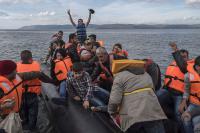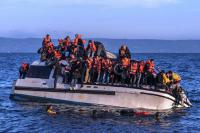-
Four questions Belgians should ask about the Patriot Act

The Paris and Brussels terrorist attacks added a sense of urgency to calls for Belgium to enact its own counterterrorism bill. It is a call the French government has already answered. Increased use of surveillance is a worldwide trend. There is no guarantee, however, that even with the most sophisticated surveillance technology out there today, passing a bill or law to collect private information on citizens will protect us from terrorist threats and violence. Even more vexing: the nature of intelligence gathering means we may never know exactly how many attacks have been prevented by the Patriot Act, the French surveillance law — or a similar law that Belgium may soon pass.
-
-
New urgency in preparing for solar storm Big One

The specter of a geomagnetic solar storm with the ferocity to disrupt communications satellites, knock out GPS systems, shut down air travel and quench lights, computers and telephones in millions of homes for days, months, or even years has yet to grip the public as a panic-inducing possibility. But it is a scenario that space scientists, global insurance corporations and government agencies from the Department of Homeland Security (DHS) to NASA to the White House Office of Science and Technology Policy (OSTP) take seriously, calling it a “low probability but high-impact event” that merits a substantial push on several fronts: research, forecasting, and mitigation strategy.
-
-
U.S. more likely to use force in a military dispute when the president is a Southerner
The United States is more likely to use force in a military dispute when the president is a Southerner, according to a new study. The study argues that “Southern honor” — an ethical code that emphasizes a reputation for resolve — pervasively shapes Southern presidents’ approach to disputes with other nations, making those presidents less willing than their peers from northern states to back down during international disputes. Consequently, Southern presidents have been more likely to use military force, resist withdrawal, and ultimately achieve victory, the study finds.
-
-
El Paso doesn't want ID as "sanctuary city"
An El Paso-based immigrant rights group could see its hopes for a municipal ID card dashed after leaders there determined that issuing the card might prompt immigration hardliners to label the town a “sanctuary city.”
-
-
Cannibal al-Nusra commander killed by rival Islamist militia

Khaled al-Hamad, otherwise known as Abu Sakkar, a senior commander of the al-Qaeda-affiliated al-Nusra Front who was filmed eating an organ of a dead Syrian government soldier, has been killed by gunmen near the Turkish border, al-Nusra has announced. Al-Hamad gained notoriety for the shocking video which surfaced in 2013, and which, for many, captured the brutality of the Syrian civil war. The cannibalism scene captured on video showed al-Hamad eating either the heart, lung, or liver of the dead soldier.
-
-
U.S. strike kills senior al-Nusra official – an al Qaeda “legacy” leader

A Pentagon spokesman said that the targets of a U.S. airstrike in northwestern Syria that were several top leaders of the al Qaeda-affiliated al-Nusra Front, including the group’s spokesman Abu Firas al-Suri. Al-Suri, a Syrian national, served in the Syrian military before being forced out for Islamist leanings. He became close to bin Laden while fighting in Afghanistan, and rose to a senior position in al Qaeda in the late 1980s.
-
-
Germany to put a Syrian refugee on trial for war crimes

A Syrian national who arrived in Germany as a refugee has been arrested and charged with war crimes in his home country. The man is accused of leading a 150-strong armed militia which tortured civilians, kidnapped others for ransom, and enriched itself by selling looted art.
-
-
What is a dirty bomb and how dangerous is it?
The worrying news that individuals affiliated with the so-called Islamic State have undertaken hostile surveillance at a Belgian nuclear research facility has created growing speculation about the group’s nuclear ambitions. There are no indications that a terrorist group has obtained any fissile material to date. An easier option for a terrorist group would be to build a dirty bomb or, technically, a radiological dispersal device. This is the reason for sensible concern, rather than hysterical speculation about Islamic State’s recent activities in Belgium and, especially, Iraq and Syria. After all, without an effective government, it is unclear who controls the many radioactive sources in the region.
-
-
Terrorists may have entered Europe hiding among asylum-seekers: EU border police

Frontex, the EU’s border police, has said that terrorists may have entered Europe by hiding among asylum seekers. Frontex noted that two of the bombers in last November’s Paris attacks made it to the continent in a smuggling boat from Turkey. “As the vast majority of migrants arrive undocumented, screening activities are essential to properly verify their declaration of nationality,” the report says.
-
-
Better tactics for dealing with terrorist threats to cities

Counter-terrorism technologies and diverse partnerships are essential when dealing with terrorist threats in cities. The findings follow the European Commission-funded TACTICS project to create a better counter-terrorism system for EU member states.
-
-
U.S. national security decision making need to be leaner, more-focused
A leaner, more-focused national security decision-making system can help the United States succeed in a period of tumultuous change, according to a new report. Increasing the effectiveness and efficiency of the National Security Council (NSC) is necessary as the country contends with many more state and nonstate actors, around-the-clock public scrutiny, and exploding nontraditional threats, according to the report.
-
-
ISIS uses mustard gas against Syrian forces in battle for airport

ISIS has used mustard gas against Bashar al-Assad’s forces in battles at a key airport in eastern Syria. The chemical weapons were used as part of the militants’ effort on Monday to recapture the military airport at Deir ez-Zor. UN officials confirmed that ISIS has the capability to build and use chemical weapons in Syria and Iraq.
-
-
Rising world military spending in 2015

World military expenditure totaled almost $1.7 trillion in 2015, an increase of 1 percent in real terms from 2014. The increase reflects continuing growth in Asia and Oceania, Central and Eastern Europe, and some Middle Eastern states. The decline in spending in the West is also levelling off. At the same time, spending decreased in Africa, and Latin America and the Caribbean. Thus, the global military expenditure picture is mixed. The United States remained by far the world’s biggest spender in 2015, despite its expenditure falling by 2.4 per cent to $596 billion.
-
-
Islamist radicals from Muslim countries tend to have engineering qualifications
Islamist radicals born and educated in Muslim countries are seventeen times more likely to have an engineering qualification than the general population in these countries. A new book, which relies on a study of over 800 members of violent Islamist groups, challenges a widely held view that many terrorists are “poor, ignorant and have nothing to lose,” according to its authors. “There is little doubt that violent Islamist radicals are vastly more educated than the general population born and educated in the Muslim world, and engineers are dramatically over-represented,” the authors say.
-
-
Leader of Nigeria’s Islamist Ansaru group arrested in Nigeria
Khalid al-Barnawi, the leader of Nigeria’s Ansaru jihadist group, a Boko Haram splinter group ideologically aligned with al-Qaeda in the Islamic Maghreb, has been arrested, a Nigerian army spokesman said on Sunday. Al-Barnawi, 47, was born as Usman Umar Abubakar in Biu town in northeast Borno state. He is one of three Nigerians listed by Washington in 2012 as “specially designated global terrorists.
-
More headlines
The long view
Are We Ready for a ‘DeepSeek for Bioweapons’?
Anthropic’s Claude 4 is a warning sign: AI that can help build bioweapons is coming, and could be widely available soon. Steven Adler writes that we need to be prepared for the consequences: “like a freely downloadable ‘DeepSeek for bioweapons,’ available across the internet, loadable to the computer of any amateur scientist who wishes to cause mass harm. With Anthropic’s Claude Opus 4 having finally triggered this level of safety risk, the clock is now ticking.”
A Brief History of Federal Funding for Basic Science
By Jake Miller
Biomedical science in the United States is at a crossroads. For 75 years, the federal government has partnered with academic institutions, fueling discoveries that have transformed medicine and saved lives. Recent moves by the Trump administration — including funding cuts and proposed changes to how research support is allocated — now threaten this legacy.
“The Federal Government Is Gone”: Under Trump, the Fight Against Extremist Violence Is Left Up to the States
By Hannah Allam
As President Donald Trump guts the main federal office dedicated to preventing terrorism, states say they’re left to take the lead in spotlighting threats. Some state efforts are robust, others are fledgling, and yet other states are still formalizing strategies for addressing extremism. With the federal government largely retreating from focusing on extremist dangers, prevention advocates say the threat of violent extremism is likely to increase.
The “Invasion” Invention: The Far Right’s Long Legal Battle to Make Immigrants the Enemy
By Molly Redden
The Trump administration is using the claim that immigrants have “invaded” the country to justify possibly suspending habeas corpus, part of the constitutional right to due process. A faction of the far right has been building this case for years.
Luigi Mangione and the Making of a ‘Terrorist’
Discretion is crucial to the American tradition of criminal law, Jacob Ware and Ania Zolyniak write, noting that “lawmakers enact broader statutes to empower prosecutors to pursue justice while entrusting that they will stay within the confines of their authority and screen out the inevitable “absurd” cases that may arise.” Discretion is also vital to maintaining the legitimacy of the legal system. In the prosecution’s case against Luigi Mangione, they charge, “That discretion was abused.”
How DHS Laid the Groundwork for More Intelligence Abuse
I&A, the lead intelligence unit of the Department of Homeland Security (DHS) —long plagued by politicized targeting, permissive rules, and a toxic culture —has undergone a transformation over the last two years. Spencer Reynolds writes that this effort falls short. “Ultimately, Congress must rein in I&A,” he adds.
